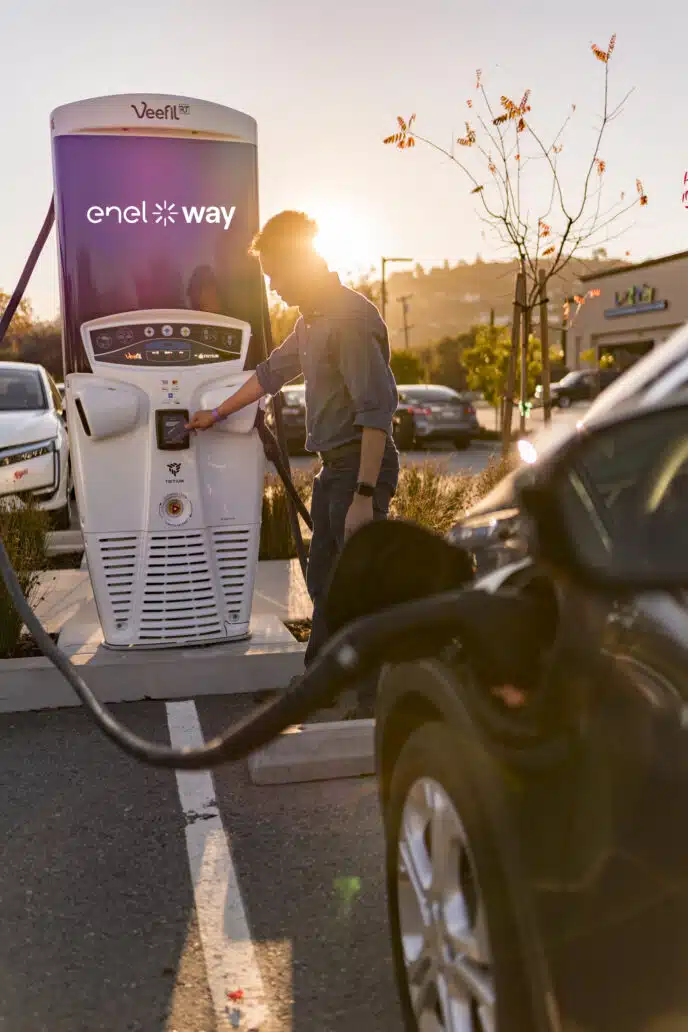Electricity vs Gas
Is EV Charging Cheaper Than Gas?
Yes, EV charging is generally cheaper than gas. On average, in the US, annual spending on gas is $3,000 while EV charging ranges from $750 to $1,000. The savings are notable, making EVs a cost-effective choice in the long run, especially with growing charging infrastructure.

In the quest for more sustainable and cost-effective transportation solutions, electric vehicles (EVs) have emerged as a promising alternative to traditional gas-powered vehicles. One of the key considerations for potential EV buyers is the cost comparison between charging an electric vehicle and refueling a gas-powered vehicle. So, is EV charging cheaper than gas? Let’s delve into the numbers to unearth the truth.
Cost Analysis: Gas vs. Electricity
Recent data reveals a compelling financial narrative in favor of EVs. Here’s a breakdown of the average yearly spending on gasoline versus EV charging across different regions as of 2023:
United States
- Gasoline: The average yearly spending on gasoline stands at $3,000.
- EV Charging: In contrast, the average yearly cost for EV charging ranges between $750 and $1,000.
European Union
- Gasoline: Individuals spend an average of €1,379 annually on gasoline.
- EV Charging: The yearly cost for EV charging is significantly lower, ranging between €800 and €1,200.
United Kingdom
- Gasoline: The annual expenditure on gasoline averages £1,171.
- EV Charging: For EV charging, the yearly cost ranges between £815 and £1,076.
What The Numbers Show
These figures depict a substantial saving when opting for EV charging over gasoline refueling. The disparity is more noticeable in the United States, where the cost of EV charging is only about 25% to 33% of the gasoline costs, on average. The cost advantage of EVs extends across different regions, highlighting the global economic benefit of transitioning to electric mobility.

Factors Influencing Cost of Gas and Electricity
Several factors contribute to the cost dynamics of EV charging and gasoline. The cost of charging an EV depends on electricity prices, which may vary based on location, time of day, whether the charging is done at home or at a commercial charging station, and other factors. Let’s take a deeper look.
Electricity Prices
The cost of electricity, which varies based on location and time, significantly impacts the cost of EV charging. Commercial charging stations may have higher rates than residential chargers, but they offer faster charging.
Gas Prices
Gasoline prices are subject to global oil market fluctuations, which can lead to unpredictable fuel expenses. Local taxes and other levies also affect gas prices, making it a less stable option compared to electricity.
Fuel Economy and Efficiency
Electric vehicles are known for their high energy efficiency, which translates to lower cost per mile. The fuel economy of gas-powered vehicles, on the other hand, can be significantly affected by driving conditions and maintenance practices.
Charging Infrastructure
The availability and accessibility of charging infrastructure can also impact the cost. At-home charging setups and commercial charging stations like those provided by Chicago EV, especially in partnership with Enel X, offer convenient and cost-effective charging solutions.
Vehicle Type and Model
The type and model of the vehicle, including its battery capacity and efficiency, also play a crucial role in the cost analysis. For instance, newer EV models with larger batteries and higher efficiency can further drive down the cost per mile.
Incentives and Rebates
Various federal, state, and local incentives, rebates, and tax credits for EV ownership and charging infrastructure can significantly offset the costs, making EVs an even more attractive financial proposition.
The Price of Your Time
One aspect that often surfaces in discussions around electric vehicles (EVs) is the time it takes to charge them. Unlike the quick fill-up times at gas stations, charging an EV can range from under an hour to several hours, depending on the charger’s speed and the EV’s battery capacity. However, it’s crucial to frame this in the context of an individual’s daily routine to grasp the real impact on time.
The beauty of EV charging is its compatibility with our daily schedules. A significant portion of EV charging occurs unobtrusively—overnight at home or during working hours at the office. With Chicago EV’s commercial chargers installed at your workplace, your vehicle gets charged while you’re productively engaged, effectively saving you a trip to the gas station. This is a convenience that gas-powered vehicles simply cannot match.
Moreover, the narrative shifts when you consider the broader time-saving benefits. The time spent on trips to the gas station, waiting in line, and the actual refueling process can accumulate to a considerable amount over a year. EVs liberate you from this routine, allowing a plug-in-charge approach that integrates seamlessly with your daily life.
Maintenance Costs
Transitioning to electric vehicles (EVs) not only alleviates fuel costs but also significantly reduces maintenance expenditures. Unlike gasoline vehicles, EVs have fewer moving parts, which translates to lower wear and tear. They do not require oil changes, and their brake systems tend to last longer due to regenerative braking which minimizes the wear on brake pads.
According to various studies, the maintenance costs for EVs can be about half compared to traditional gasoline vehicles over the lifetime of the car. Furthermore, with the availability of commercial charging stations like those provided by Chicago EV, keeping your EV charged and well-maintained has never been easier.
Government Incentives and Policies
The adoption of EVs is heavily incentivized by various government bodies to promote a shift towards more sustainable transportation. These incentives often come in the form of tax credits, rebates, or grants.
For instance, the federal government offers tax credits to EV buyers, which can substantially reduce the upfront costs of purchasing an electric vehicle. Additionally, many states including Illinois, as well as local municipalities have their own set of incentives to encourage EV adoption.
These may include additional rebates, reduced registration fees, carpool lane access, and even free or discounted charging at public charging stations. By making the switch to electric, individuals and businesses not only contribute to reducing emissions but also stand to benefit financially from various government incentives.
Furthermore, with the installation of commercial charging stations like those from Chicago EV, businesses can further leverage incentives aimed at bolstering EV charging infrastructure, making the transition to electric mobility even more rewarding.
The Broader Picture
Beyond the direct cost comparison, it’s worth noting that the cost per mile to drive an EV is dramatically lower than that of a gas-powered vehicle. As of March 2022, nationally, EVs were found to be 3-5 times cheaper to drive per mile than gas-powered vehicles.
Moreover, as EV technology continues to advance, and as electricity prices remain relatively stable compared to the fluctuating gasoline prices, the cost advantage of EV charging is likely to widen further.
Final Thoughts
The evidence is robust – charging an EV is, on average, considerably cheaper than refueling a gas-powered vehicle. This financial advantage, coupled with the environmental benefits and the growing network of commercial EV charging stations like those installed by Chicago EV, reinforces the compelling case for making the switch to electric.
Through our preferred partnership with Enel X, Chicago EV is committed to facilitating a seamless and cost-effective transition to electric mobility for businesses in the Chicagoland area.